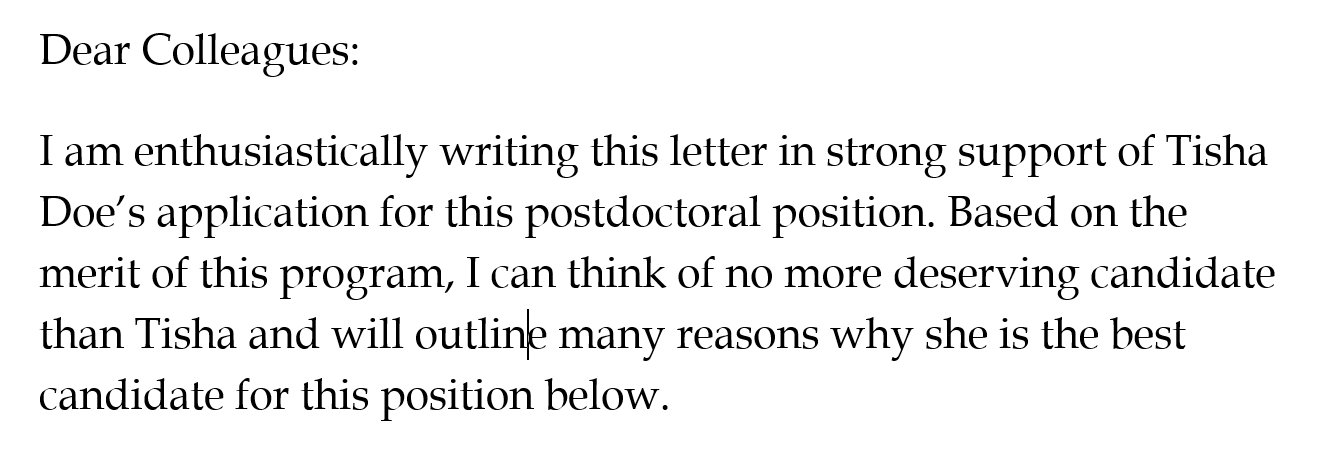
An often-necessary part of securing your next position after graduate school is having references and recommendation letter writers vouch for why you’re so awesome. Not every employer will require recommendation letters however for those that do, you want to make sure that these letters further support what’s found in your resume or curriculum vitae. The worst is when someone agrees to write you a letter and it just paints you as average, or even worse doesn’t have anything meaningful or supportive to say about you.
As a reviewer of applicants for various positions at different career stages, when letters are required, I most certainly take time to read through these letters. And that can mean sometimes reading between the lines about what is said or is not said about a candidate. These letters do weigh into the application and I stress, do matter. So here are three things that I’ve noticed that graduate students should consider before asking for that next recommendation letter.
Who you ask to write letters for you matters
There are always end of the semester requests that professors get from students in their classes to write them a letter of recommendation for a fellowship application, an internship, postdoctoral position, or a job. And while most professors are supportive of students sometimes, could be honestly surprised when being asked to write the letter. The only interaction they may have had with that student was giving back exams, possibly calling on them to answer a question throughout the semester, and the moments in which they are asking for this request. Thus, the letter that they can write becomes difficult because they don’t have a lot to go on except for a few observations and the contents of the student’s resume and application materials. But in context, so do the other letter writers and because this information is in the application, it’s likely that this professor’s letter is not adding a lot of value to the application.
Or on the other side of things, I have reviewed application materials and in reading the recommendation letter could not believe that the recommender would take the time to write such an unsupportive letter. But apparently it was important for them to share their truth about the applicant. So, the lesson here is to ensure that you are only asking people to write you letters that you honestly trust and believe will write you strong and phenomenal letters.
And the assured way to do this is to think of potential letter writers well in advance of when you will need them. This could be a professor whose class you are taking but you actually take time to go to office hours, learn about their research, or strike up conversations with them in the hallway when possible. This could be a committee member who is well-aware of your research but because they are familiar with you will be able to add some additional insight to their recommendation letters. Or this could be a mentor from a professional society or otherwise, that while they can’t speak to your research, know enough about your development as a graduate student, challenges or obstacles you’ve overcome, and can put authentically genuine comments in their letter.
Choose well here and begin this process early. Stay in touch with your professors whose classes you took. Reach out to collaborators and take opportunities to provide research updates. Inform mentors of successes you have along the way. These small steps will add up when it’s time to make the request for a letter later, and it will give them plenty to say in support of you.
What the writers say about you matters
For the best of letters that are written, not only is it clear how the person really is the best for a particular position, but there are several pieces of evidence that the writer includes to support this. This generally speaks a lot to me as a reviewer because I know the time that it took for that letter to be written and also that the comments are genuine. This goes a long way in further solidifying the applicant being strongly considered, especially if that was already made clear from the applicant’s own materials.
And in some cases, while a letter may not be outright unsupportive, a vague letter or one without much to say about the actual applicant also does not help strengthen the application. So, while you may not be privy to what is said in the letter (especially if you waived the right to see the letter), then you can help the letter writer along. Specifically, you can share with them a list of critical highlights that would be important to have them speak to in your letter or importantly that jog their memory about something that is relevant for this application. That makes their work easier in writing the letter and it ensures that you can have them especially speak to things that maybe they are only required to as opposed to your other letter writers. For example, a mentor may be able to speak directly to some challenges that they were aware you were going through and give context to a lower course grade or an unproductive semester, that your advisor may not have had insight to.
When you ask someone to write for you matters
And finally, this point is short. Don’t wait until the last minute to ask someone to write you a letter. A last-minute letter if the writer agrees to even do it, will undoubtedly yield a letter that is not the best that it could have been with a little more time. At least 2 weeks is respectable across the board, but generally if you identify someone that you think will be supportive even months prior, you can at least begin the conversation with them of asking if they would support you moving forward as a reference and recommendation letter writer when needed. I’d agree to that. And even in last-minute circumstances, would be more willing to help support someone that I had a connection to throughout their graduate journey.
Until next time,
Renã AS Robinson, PhD

